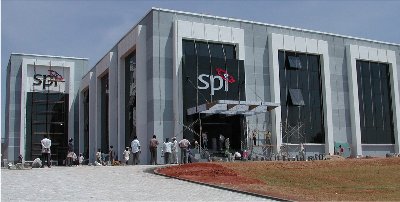Outsourcing: Interview with Sid Mookerji
First Online: April 18, 2006
Page Last Updated: December 07, 2024
Atlanta based Software Paradigms International (SPI) opened a new campus in the city of Mysore in March 2006 and Vikas Kamat caught up with Sid Mookerji, CEO of SPI for a conversation.

A Building in the newly opened SPI Campus, "SPI-City" near Mysore
Vikas: Congratulations on the opening of the new campus! Please tell our readers briefly about SPI, SPI-Project and SPI's famed Quality Control Methodology.
 Sid:
SPI is an eleven year old company that provides Information Technology (IT) Services and Business Process Services using a Global Delivery Model. We have become
specialists in the IT based outsourcing disciplines through a combination of right people, right processes, and right tools. 75% of
our on site managers are certified Project Management professionals (PMPs) from
the Project Management Institute (PMI). We also have Six Sigma Black Belts as well as key certifications and assessments in quality. Most notably SPI
received a CMMI Level 5 assessment from KPMG; only around 100 companies in the world can boast of such a credential.
(see: List of CMM-5 Certified Companies in India)
Sid:
SPI is an eleven year old company that provides Information Technology (IT) Services and Business Process Services using a Global Delivery Model. We have become
specialists in the IT based outsourcing disciplines through a combination of right people, right processes, and right tools. 75% of
our on site managers are certified Project Management professionals (PMPs) from
the Project Management Institute (PMI). We also have Six Sigma Black Belts as well as key certifications and assessments in quality. Most notably SPI
received a CMMI Level 5 assessment from KPMG; only around 100 companies in the world can boast of such a credential.
(see: List of CMM-5 Certified Companies in India)
However, our biggest differentiator is spiProject®,
a web based enterprise management tool that manages the entire lifecycle of
multiple projects using a portal-based approach. The tool in addition to comprehensive project management, provides modules to track time, requirement life cycles, issues and bugs, documents etc. It would not
be an exaggeration to call it SPI's lifeline and to take that biological metaphor forward,
spiProject® embeds process and quality into the genes of the organization.
![]() Tell us why you chose the city of Mysore (rather than Bangalore or
Hyderabad, as the conventional wisdom
would dictate) to build your IT infrastructure and
operations?
Tell us why you chose the city of Mysore (rather than Bangalore or
Hyderabad, as the conventional wisdom
would dictate) to build your IT infrastructure and
operations?
Sid: Secondary cities can become an advantage to do business in, if the infrastructure exists. In the USA, several companies have headquarters in otherwise anonymous towns -- for example, Walmart in Bentonville, Arkansas. We bet on the bigger centers becoming over-extended in terms of resources and excellent infrastructure becoming available in Mysore. In 1998, one year after we started our offshore development center, STPI (Software Technology Parks of India) chose Mysore as its first non-capital city location. Mysore has the fundamentals right: great weather, superb educational institutions and a superior quality of life. Another point to ponder: in my opinion, corporations own some responsibility to not just exploit already strained resources in the big cities but develop secondary locations as well. I am glad that SPI has been able to make tangible contributions to Mysore while running a great business.
![]() Most software companies in India enjoy tax shelters
as "export units", and some have suggested elimination
of this preferred treatment. What are your thoughts?
Will removal of these tax benefits make the Indian
industry less competitive?
Most software companies in India enjoy tax shelters
as "export units", and some have suggested elimination
of this preferred treatment. What are your thoughts?
Will removal of these tax benefits make the Indian
industry less competitive?
Sid: No, I don't believe that governmental protections are beneficial to the Indian IT industry in the long run. It reduces government revenue from a very profitable industry and that has a negative effect on infrastructure development and maintenance. It also encourages companies to not worry about operational efficiency instead using the government largesse to provide 'low prices'. If the tax benefits are removed, it will have a short term negative impact on profitability. But I am willing to take that in exchange for long term health of the industry.
![]()
Removal of tax benefits for IT industry will improve the health of industry in the long run.
![]()
![]() I commend you for providing leadership in software
development methodologies and services. Do you think
SPI can offer the same level of quality and pioneering
models in other areas (namely ITES and non-software
related services) as you diversify?
I commend you for providing leadership in software
development methodologies and services. Do you think
SPI can offer the same level of quality and pioneering
models in other areas (namely ITES and non-software
related services) as you diversify?
Sid: We do have a BPO offering centered on back-office functions such as accounting and data entry as well as contact centers. One area that we have added recently to our portfolio of services is called 'Technology Vendor Managed Services' (TVMS). This is a suite of services that helps IT outsourcing customers manage contracts and performance of multiple IT outsourcing vendors using a portal based tool and best of breed methodologies. Of course, spiProject® is the fulcrum around which this offering has been based. The interesting part is that even though this service constitutes moving up the value chain for SPI, existing customers have invited us for projects around this offering. We are already executing projects with three different customers in this area.

Shankaralinge Gowda (ITSecretary) and B.V. Naidu (STPI Director)
inaugurating the new SPI facility on March 18, 2006
![]() I find that a high-tech company like SPI or Infosys
diversifying into low-tech areas such as BPO or
clerical fields like accounting as a step backwards.
Why not enter even high-tech fields?
I find that a high-tech company like SPI or Infosys
diversifying into low-tech areas such as BPO or
clerical fields like accounting as a step backwards.
Why not enter even high-tech fields?
Sid: I agree with you - BPO moves a company like SPI down the value chain and is hence not desirable. However, it completes the menu for customers looking seriously to outsource parts of their business. Having said that, the future of IT outsourcing lies with specialization and ownership of content and knowledge. Our TVMS offering productizes one of our strengths and I suspect this is where more successful players in the industry are headed. The other area is content - what you have at kamat.com may be more valuable than a vast resume of successful projects for a company in the years to come.
![]()
For a high technology services firm, getting into the business process outsourcing (BPO) completes the menu customers are looking for.
![]()
![]() During my trips across India, there is
disillusionment and anger about the Indian IT industry
among the common folk. What can the industry do to
allay this mistrust? Is the IT prosperity here to
stay?
During my trips across India, there is
disillusionment and anger about the Indian IT industry
among the common folk. What can the industry do to
allay this mistrust? Is the IT prosperity here to
stay?
Sid: I can appreciate that the common man in India looks at the glitzy cars, western accents and neo-rich IT workers with distrust, even disdain. Well, IT has happened and in my opinion IT - with its extravagances - is here to stay for the foreseeable future. The IT industry has made India a viable global player. I suspect that the success in IT will flow over to other areas. I would say that IT companies have to make tangible contributions to help society and publicize them enough to make a dent in the negative perceptions of the people. SPI, for example, contributes each month to a local orphanage enough to take care of all their food related expenses. There are many other social development programs that SPI and its employees are participating. I think the "mistrust of IT industry" as you describe is uncalled for.
![]() Tell us briefly about SPI as a responsible employer
in USA. I ask this because of the common misconception
that Indian companies exploit cheap labor and work
around the immigration and labor laws of USA.
Tell us briefly about SPI as a responsible employer
in USA. I ask this because of the common misconception
that Indian companies exploit cheap labor and work
around the immigration and labor laws of USA.
Sid: Integrity is one of SPI's core values and treating our employees fairly is an integral principle for us. Procedurally, SPI staffs its projects differently from most other offshore outsourcers. We hire our onsite presence predominantly in the USA (not ship them from India). We also pay our employees well enough and inspire enough that almost no one quits! We have had foreign employees stay with us even after their Green Card come through -- we have people working with us for the past seven years or more.
We have many American citizens in our various teams, and we are a responsible employer. Further, we have customers all over the world, and it is not uncommon for our employees from Atlanta office to relocate to a customer site on another continent.
![]() If there is one thing Indian Government (local or
federal) can do for SPI, what would it be?
If there is one thing Indian Government (local or
federal) can do for SPI, what would it be?
Sid: Focus on infrastructure development, legislate and implement fair and growth-friendly labor laws and maintain law and order. Those are the only things I would want the Indian government to do - all else should be left to Adam Smith's "invisible hand".
One final comment if I may: you and I have had a long association and I have looked with wonder at the leaps and bounds by which Kamat's Potpourri website has progressed into becoming a premier source for any information about Indian culture. As a friend and also as an Indian I am proud of what you have achieved here. Your brand of 'out of the box "knowledge-based entrepreneurship" could be the next big step for Indian IT.
![]()
Out-of-the-box "knowledge-based entrepreneurship" might be the next big step for Indian IT.
![]()
Vikas: Thank you for your insightful answers Sid. And best wishes to your team!
![]()
See Also:
- Website of Software Paradigms International
- Kamats @ Infosys Campus
- Memoirs of Mysore -- Jyotsna Kamat recalls experiences as a Central Government employee trying to make peace with angry local activists in Memoirs of Mysore
- Computers in Villages -- Experiences of introducing computers in rural India during 1980s; includes quotes on why India needs computers.

